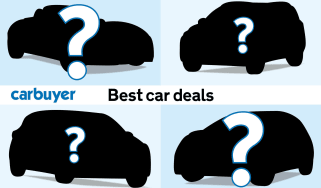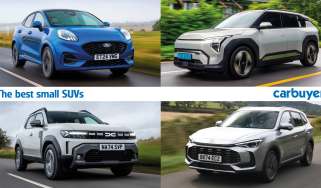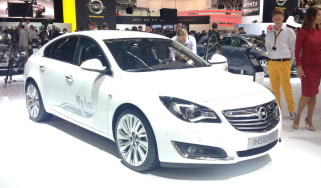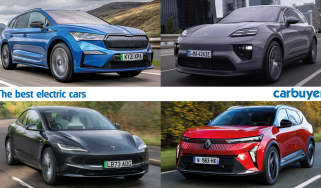Vauxhall Insignia saloon (2008-2017)
"The Vauxhall Insignia is styled more like a sporty coupe than a family saloon, and while it has an upmarket feel, it’s not as practical as its main rival, the Ford Mondeo."
Pros
- Coupe-like styling
- Good driving position
- Wide choice of engines and trims
Cons
- High emissions compared to rivals
- Tight rear headroom
- Poor resale values
When a manufacturer ditches a long-standing in favour of an all-new car with a different name, that means it wants to make a statement. That’s just what happened with the Vauxhall Insignia in 2008, when it took over from the drab Vauxhall Vectra as the brand's flagship family saloon.
And when Insignia was crowned European Car of the Year in 2009, Vauxhall was bold enough to claim it was a genuine rival for executive saloons such as the BMW 3 Series and Audi A4. Realistically, however, it’s a rival for slightly more down-to-earth family cars such as the Ford Mondeo and Skoda Superb.
The Insignia is a good car, but it doesn’t set the world alight and it's not especially good value, either. However, it did receive a mid-life update in late 2013, getting stop-start technology to boost efficiency. Plus, you can always get a good deal from a Vauxhall salesman if you haggle.
Buyers can pick from three main body styles for the Insignia – hatchback, saloon and Sports Tourer estate – and all are available as VXR Supersport high-performance models, too. The standard car’s hatchback body is styled more like a sporty coupe than a family car, and there's a large range of engines and specification levels to choose from.
MPG, running costs & CO2
All versions of the Insignia (bar the very fast VXR) are fairly cheap to run, but the 2.0-litre CDTi ecoFLEX model with stop-start technology is the most efficient. Both the 118bhp and 138bhp versions of this engine return 76.3mpg and have CO2 emissions of 99g/km, which makes them exempt from road tax.
More reviews
In-depth reviews
- Vauxhall Insignia hatchback review (2017-2022)
- Vauxhall Insignia Sports Tourer estate (2017-2019)
- Vauxhall Insignia Country Tourer estate (2017-2019)
- Vauxhall Insignia hatchback (2008-2017)
- Vauxhall Insignia Country Tourer (2013-2015)
- Vauxhall Insignia Sports Tourer estate (2008-2017)
- Vauxhall Insignia VXR hatchback (2009-2017)
As usual, the petrol engines aren’t as economical as the diesels, but they are cheaper to buy, so you should consider how much mileage you do when deciding which one to go for. Steer clear of the 2.0-litre SIDI turbodiesel engine with an automatic gearbox, because it pumps out 186g/km of CO2 and only returns 35.8mpg. Compare that to a BMW 320d, which is faster, more powerful and better to drive – yet still returns more than 60mpg.
Unfortunately, figures for the performance-focused VXR petrol model are even worse, so you'll need deep pockets to enjoy its earth-shattering performance on a regular basis.
Engines, drive & performance
The Insignia doesn't have the same driver appeal and sense of fun you get with a Ford Mondeo, yet it's still a decent choice for anyone who regularly drives long distances. The steering is on the light side, but the car feels solid and stable at speed, with plenty of grip on the move.
The extensive range of engines should offer something to suit just about everyone, with the top-of-the-range VXR Supersport model hitting a top speed of 170mph and accelerating from 0-62mph in just 5.6 seconds. The mid-range diesels will suit the vast majority of buyers better – the 128bhp 2.0-litre CDTi does 0-62mph in 10.4 seconds and has plenty of performance for long motorway cruises.
The interior is fairly impressive, too: it's easy to find a comfortable driving position in the supportive front seats. Also, the high gearlever has an easy, light shift action, making light work of changing gear.
Interior & comfort
The Insignia is comfortable enough, but isn’t the most refined car in its class by any means. It's a good choice for long motorway journeys, with plenty of room for the driver and the passenger in the front. Rear legroom is good, but headroom back there is less impressive due to the car's sloping roofline
Road, wind and tyre noise are all suitably hushed at motorway speeds, and the suspension ensures a smooth ride on most road surfaces. A word of warning, though: if you choose the bigger alloy wheels on the SRi or VX-Line models, the car tends to thump into potholes and follow ruts in the road.
And if comfort really is a top priority, we’d suggest paying extra for Vauxhall’s FlexRide adaptive damping system. This automatically tweaks the suspension, steering and throttle to match whatever driving conditions you meet on the road.
Practicality & boot space
With the back seats in place, the Insignia offers a reasonable 530 litres of boot space – a tiny bit more than a Ford Mondeo. That space is easily accessible thanks to a wide boot opening and an easy-to-use hatchback tailgate. Fold down the standard 60:40 split-folding rear seats and it's increased to 1,470 litres.
Unfortunately, the boot doesn’t have a completely flat floor, so loading and carrying longer items is trickier than you'd think, and the Skoda Superb has a more usefully shaped boot. On a more positive note, there’s loads of passenger space in the front, plus plenty of handy storage cubbies and a large glove compartment.
If you need even more space, the Vauxhall Insignia Sports Tourer estate can hold 540 litres (expanding to 1,530 litres with the seats down). As you'd expect, the saloon version isn't as practical as the hatchback, with significantly less seats-down boot space than the hatchback.
Reliability & safety
The Vauxhall Insignia had a shocking showing in the 2013 Driver Power customer satisfaction survey, plummeting 77 places down the list of the top 100 cars to rank 98th. It debuted in 2011 at number six, then dropped to a reasonable 21st in 2012. Reasons cited include poor performance, high running costs, sub-standard build quality and disappointing reliability.
This trend is reflected in Vauxhall’s overall performance in the survey's manufacturer rankings. It dropped 13 places to come 26th out of 32 in 2013, which is disappointing considering it was the most-improved brand in 2012.
In better news, the Insignia secured the maximum five-star rating in the Euro NCAP crash-safety tests. All models have six airbags and electronic stability control as standard. You can also add bright xenon headlamps (which follow the steering to improve visibility at night) and a tyre-pressure monitoring system.
Price, value for money & options
You can and should always haggle with a Vauxhall dealer, because they're very likely to offer a decent discount. That will make any Insignia significantly better value for money, but be aware that the entry-level model doesn't have much standard equipment. The least expensive ES and Exclusiv specs feature air-conditioning and cruise control, but they have manually operated rear windows and plastic wheel trims rather than alloy wheels.
The SRi, SE, ecoFLEX and Elite versions are all better equipped, so it's really a case of picking the best balance of price and equipment to suit your budget and needs. Cars at the top end of the range are undeniably expensive and will lose a lot of value very quickly. If a decent resale price is a priority, you’d be better off looking at a Volkswagen Passat or Skoda Superb.












